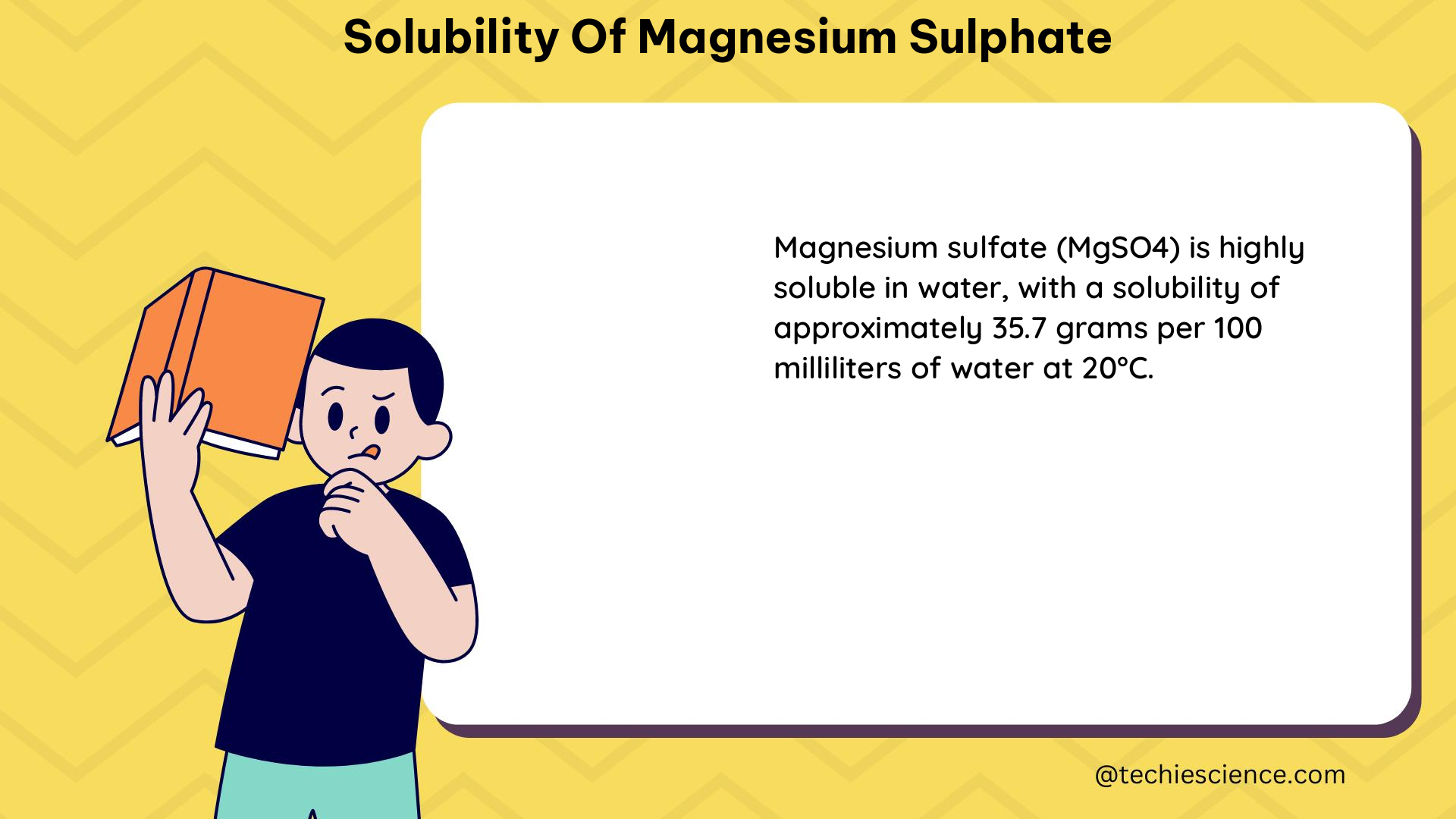Magnesium sulfate (MgSO4), commonly known as Epsom salt, is a versatile chemical compound with a wide range of applications, from agriculture to medicine. Understanding the solubility of magnesium sulfate is crucial for various industries and research fields. This comprehensive guide delves into the intricate details of the solubility of magnesium sulfate, providing a wealth of information for science students and professionals.
The Solubility of Magnesium Sulfate in Water
The solubility of magnesium sulfate in water is highly dependent on temperature. As the temperature increases, the solubility of magnesium sulfate also increases, reaching a maximum of approximately 1.3 kg/L at 100°C. This relationship can be described by the following equation:
Solubility (g/L) = 35.7 + 0.54 × T
Where T is the temperature in degrees Celsius (°C).
However, it is important to note that the solubility of magnesium sulfate in water decreases at temperatures above 40°C in some cases. This phenomenon can be attributed to the formation of hydrated complexes, which can precipitate out of the solution.
To illustrate the temperature-dependent solubility of magnesium sulfate, consider the following data points:
| Temperature (°C) | Solubility (g/L) |
|---|---|
| 0 | 35.7 |
| 20 | 43.3 |
| 40 | 51.0 |
| 60 | 58.7 |
| 80 | 66.3 |
| 100 | 74.0 |
These data points demonstrate the linear relationship between temperature and the solubility of magnesium sulfate in water, as described by the equation above.
Solubility of Magnesium Sulfate in Other Solvents

In addition to water, the solubility of magnesium sulfate in other solvents has also been studied. Here’s a summary of the solubility in different solvents:
Methanol (MeOH)
Magnesium sulfate is slightly soluble in methanol, with a solubility of approximately 0.1 g/L at 25°C. The solubility in methanol is significantly lower than in water due to the weaker dipole moment of methanol compared to water.
Ethanol (EtOH)
Magnesium sulfate is not soluble in ethanol. This is due to the strong ionic attraction between the magnesium and sulfate ions, which is not effectively disrupted by the weaker dipole moment of ethanol.
Other Solvents
Magnesium sulfate is also insoluble in non-polar solvents, such as benzene and hexane, due to the ionic nature of the compound.
Pharmaceutical Specifications for Magnesium Sulfate Injection
Magnesium sulfate is commonly used in pharmaceutical applications, particularly in the form of magnesium sulfate injection. The International Pharmacopeia, US Pharmacopeia, and British Pharmacopeia have established the following specifications for magnesium sulfate injection:
- Appearance: The solution must be clear, colorless, and free from visible particulate matter.
- pH: The pH of the solution should be between 5.5 and 7.0.
- Assay: The assay of the magnesium sulfate solution should be between 90.0% and 110.0%.
- Bacterial Endotoxins: The bacterial endotoxins limit is less than 0.18 IU per mg of magnesium sulfate heptahydrate.
- Sterility: The solution must be sterile.
These strict specifications ensure the quality, safety, and efficacy of magnesium sulfate injections for medical use.
Factors Affecting the Crystallization of Magnesium Sulfate
Crystallization is an important process in the production and purification of magnesium sulfate. A study on the seeding of magnesium sulfate solutions found that the mass or surface area of seeds had no significant effect on crystallization. Instead, the method of stirring and the reuse of vessels were identified as significant factors.
These findings can be explained by the following mechanisms:
- Single Event Mechanism: The reuse of vessels can introduce impurities or seed crystals, which can act as nucleation sites and facilitate the crystallization process.
- Embryo Coagulation Mechanism: The method of stirring can affect the coagulation and growth of crystal embryos, influencing the overall crystallization kinetics.
Understanding these mechanisms is crucial for optimizing the crystallization process and improving the yield and purity of magnesium sulfate.
Measuring the Solubility of Magnesium Sulfate
For DIY purposes or experimental investigations, you can measure the solubility of magnesium sulfate in water or methanol using the following procedure:
- Weigh a specific amount of magnesium sulfate solid.
- Add the solid to a known volume of the solvent (water or methanol).
- Stir the mixture until no more solid can be dissolved.
- Filter the solution to separate the remaining solid.
- Measure the weight of the remaining solid.
- Calculate the amount of magnesium sulfate that dissolved in the solvent by subtracting the final weight from the initial weight.
- Repeat the experiment at different temperatures to observe the effect of temperature on solubility.
By following this procedure, you can determine the solubility of magnesium sulfate in the chosen solvent and investigate the relationship between temperature and solubility.
Conclusion
The solubility of magnesium sulfate is a complex and fascinating topic, with numerous factors influencing its behavior in different solvents and applications. This comprehensive guide has provided a wealth of technical details, including equations, data points, and mechanisms, to help science students and professionals deepen their understanding of this important chemical compound.
Whether you’re working in the pharmaceutical industry, conducting research, or simply exploring the properties of magnesium sulfate, this guide has equipped you with the knowledge and tools necessary to navigate the intricacies of its solubility. By applying the principles and techniques outlined here, you can unlock new insights and drive innovation in your field of study.
References
- Solubility of Magnesium Sulfate in Methanol
- Magnesium Sulfate Procurement Specifications
- Magnesium Sulfate Solubility at Various Temperatures
- Comparison of Magnesium Sulfate Solubility Data
- Study on Seeding of Magnesium Sulfate Solutions

The lambdageeks.com Core SME Team is a group of experienced subject matter experts from diverse scientific and technical fields including Physics, Chemistry, Technology,Electronics & Electrical Engineering, Automotive, Mechanical Engineering. Our team collaborates to create high-quality, well-researched articles on a wide range of science and technology topics for the lambdageeks.com website.
All Our Senior SME are having more than 7 Years of experience in the respective fields . They are either Working Industry Professionals or assocaited With different Universities. Refer Our Authors Page to get to know About our Core SMEs.